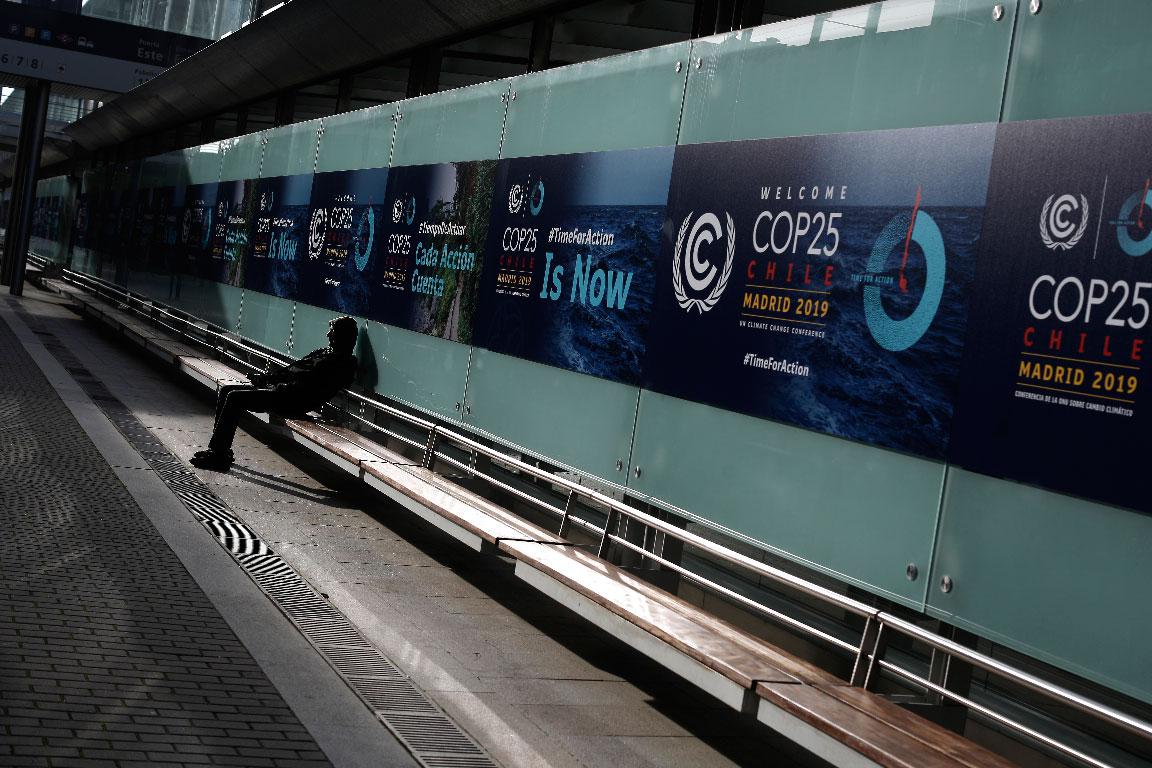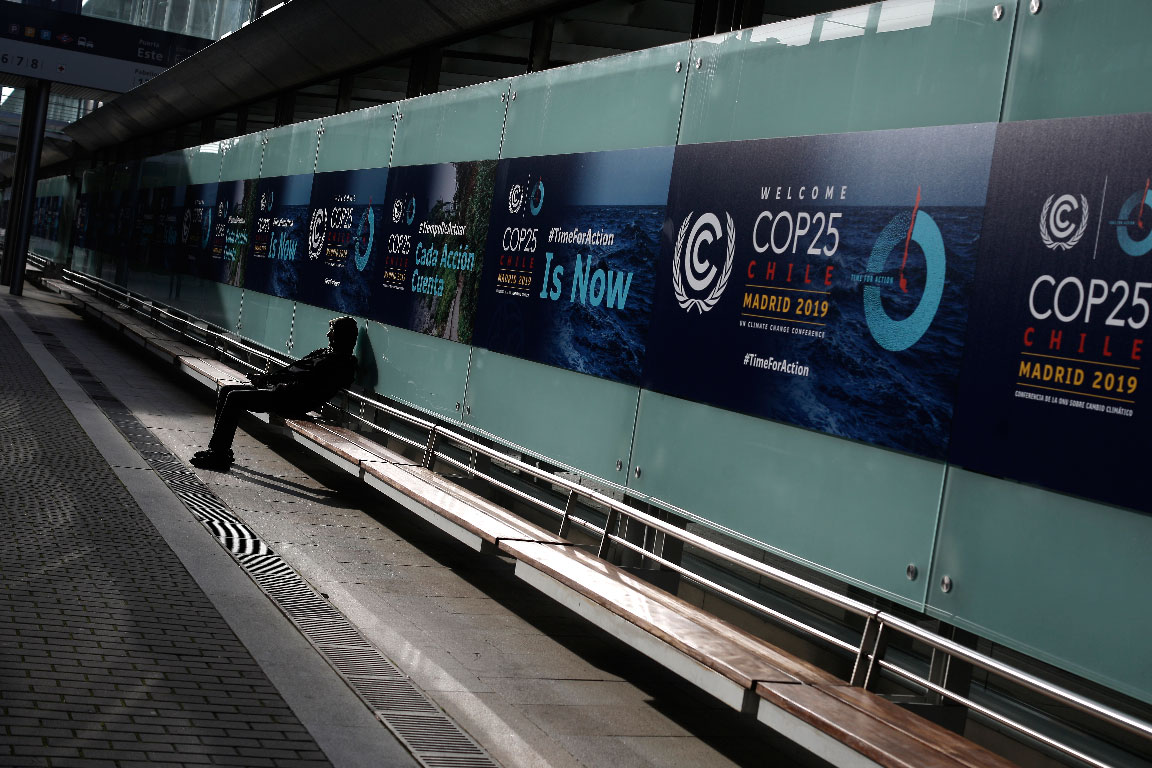Major economies resist bold action at UN climate summit
MADRID - A UN climate summit in Madrid risked collapsing Saturday after all-night negotiations between countries left them more divided than ever over on how to fight global warming and pay for its ravages.
Diplomats from rich nations, emerging giants and the world's poorest countries - each for their own reasons - found fault in a draft agreement put forward by host Chile in a botched attempt to strike common ground.
Ministers had broken into groups on Saturday for eleventh-hour negotiations on a tangle of issues, including finance for climate-vulnerable countries, carbon markets, and the all-important issue of the strength of the summit's final text.
With the clock ticking, Andres Landerretche, Chile's summit coordinator, said the goal was to conclude on Saturday. "The vast majority of delegations are asking for a more ambitious text, and that's what we're aiming at," he told reporters.
But as the two-week gathering spilled into the weekend, campaigners and many nations slammed Chile for drafting a summit text that they said risked throwing the 2015 Paris Agreement to tackle global warming into reverse.
"The approach Chile has taken on this text shows how it has listened to the polluters and not to the people," said Jennifer Morgan, executive director of Greenpeace International.
"At a time when scientists are queuing up to warn about terrifying consequences if emissions keep rising, and school children are taking to the streets in their millions, what we have here in Madrid is a betrayal of people across the world," said Mohamed Adow, director of Power Shift Africa, a climate and energy think-tank in Nairobi.
Faced with five-alarm warnings from science, deadly extreme weather made worse by climate change, and weekly strikes by millions of young people, negotiations in Madrid were under pressure to send a clear signal that governments are willing to double down in tackling the crisis.
But the 12-day talks, now deep into overtime, had retreated even further from this goal on Saturday.
Unprecedented disconnect
Veteran observers of UN climate talks were stunned by the state of play nearly 24 hours after the negotiations had been set to close. Many expressed outrage at the unwillingness of major polluters to show ambition commensurate with the gravity of the climate crisis, after a year of wildfires, cyclones, droughts and floods.
"I have never seen such a disconnect between what the science requires and the people of the world demand, versus what the climate negotiations are delivering," Alden Meyer, strategy and policy director at the Union of Concerned Scientists, said.
Under the Paris accord, 196 nations agreed in 2015 to work to limit global temperature rises to "well below" two degrees Celsius through a series of voluntary action pledges that step up over time.
"The one thing in Paris that gave us hope was that the deal is going to be strengthened over time," said Adow. "If that doesn't come through, Madrid will have failed."
The Paris agreement enters a crucial implementation phase in 2020, when countries are supposed to ratchet up their ambitions ahead of the next major round of talks in Glasgow.
If big polluters such as China, India, Japan, Brazil, Australia and others fail to agree more meaningful climate action soon, then scientists say already slim hopes of averting catastrophic temperature rises will all but vanish.
The European Union and small island states had been calling for the Madrid decision to signal that the countries participating in the Paris process will submit more ambitious pledges to cut emissions next year.
Ministers from this "high ambition coalition" have called out countries they see as blocking a consensus call for all countries to step up, notably the United States, Australia and Saudi Arabia.
China and India, the world's No. 1 and No. 4 carbon emitters, meanwhile, have made it clear they see no need to improve on their current emissions reduction plans, which run to 2030.
These emerging giants have chosen instead to emphasise the historical responsibility of rich nations to lead the way and provide financing to poor countries.
The COP 25 summit was also meant to finalise a chapter on carbon markets in the Paris rulebook, which goes into effect next year.
But a complicated wrangle over how to structure markets, and deal with carbon credits left over from the Kyoto Protocol, which expires at the end of 2020, have remained deadlocked, and may be punted to further talks next year.
'Prove it's worth it'
Although no advanced economy is yet on track for the kind of action scientists say is needed to steer the climate onto a safer path, all the EU's 28 member states, bar Poland, agreed in Brussels on Thursday to target net zero emissions by 2050.
Krista Mikkonen, Finland's environment minister, speaking on behalf of the EU, told the talks that it would be "impossible to leave" without agreeing a "strong message" on the need to redouble pledges to cut emissions next year.
Tina Steger, the Marshall Islands' climate envoy, echoed the call, telling delegates: "It appears that we are going backwards on the issue of ambition when we should be calling for a quantum leap in the other direction."
"I need to go home and look my children in the eye and say we got an outcome that is going to ensure their future, and the future of all of our children," she added, a catch in her voice.
The Paris process has already been weakened by a move by US President Donald Trump to begin withdrawing the world's largest historical emitter from the agreement last month, making it easier for other big countries to backslide.
The US was accused of acting as a spoiler on a number of issues vital to climate-vulnerable nations. This included so-called "loss and damage" funding to help disaster-hit countries repair and rebuild.
"The US has not come here in good faith," said Harjeet Singh, climate lead with charity ActionAid. "They continue to block the world's efforts to help people whose lives have been turned upside down by climate change."
Even if nations in Madrid snatch victory from the jaws of defeat and agree to implement their pledges, Earth is on course to warm more than 3C by 2100.
"It is time for this process to prove that it is worth something," said the delegation of Colombia.
"If there was one time in the history when I would say governments fucked up, I would say today in Madrid, governments fucked up," Adow said. "People across the world must rise to save the planet."





